八年级英语冀教版反义疑问句PPT优秀课件
初中英语《反义疑问句》优质课件
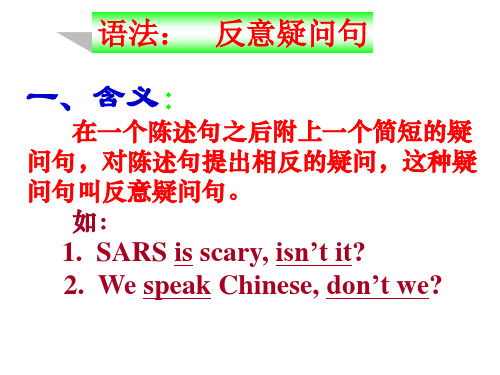
12) 陈述部分由neither… nor, either… or 连接的并列主语时, 疑问部分 根据其实际逻辑意义而定。 Neither you nor I am engineer, are we?
9) You'd like to go with me, _w_o_u_l_d_n_'t_y_o_u_? 10) He must be a doctor,__is_n_'t_h_e____?
或 usedn't + 主语。
He used to take pictures there, didn't he? / usedn't
he? 7) 陈述部分有had better + v. 疑问句部分用hadn't you?
You'd better read it by yourself, hadn't you? 8) 陈述部分有would rather +v.,疑问部分多用 wouldn't +主语。
He said he wanted to visit Japan, didn't he? c. 上述部分主句谓语是think, believe, expect, suppose, imagine等引导
的宾语从句(尤其当主句主语是第一人称时),疑问部分与宾语从句 相对应构成反意疑问句。
I don't think he is bright, is he?
15) Everyone knows the answer, don't they? (does he?)
(课件)英语八下冀教版Unit3语法专题
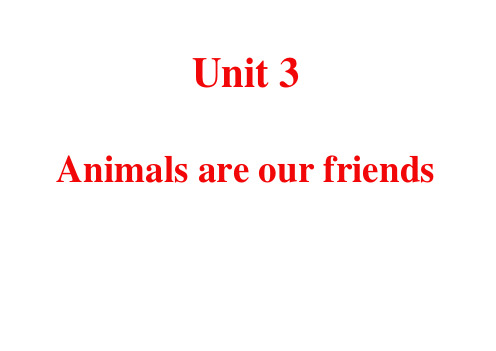
Unit 3 Animals are our friends反意疑问句一、反意疑问句的概念:反意疑问句也叫附加疑问句,指的是在陈述句后面附加一个简短的一般疑问疑问,用于对陈述句所说的事实或观点提出疑问或表示证实。
二、反意疑问句的结构:陈述部分为肯定式时,疑问句部分用否定式;陈述部分为否定式时,附加部分用肯定式。
Youare from Australia, aren9t you? He doesn't live In Beijing, does he?三、反意疑问句的缩写问题及主语问题。
当反意疑问句的附加部分为否定式时,习惯上只用缩写形式,不能分开来写,同时反意疑问句部分的主语应与陈述部分主语一致,且只能是代词,不能是名词。
(there be 除外)is I isn9t was / wasn9t can I can9* does / doesn^t did / didn't have / haven9t are / aren*t were / weren9t do / doiftwill I won't has / hasn'tI、反意疑问句的注意事项(一)、陈述句部分出现no / nobody / nothing / few / little / never / seldom / hardly 等表示否定意义的词时,反意疑问部分应用肯定形式。
1.Li Ming has no brothers or sisterfops he ?2.He saw nothing strange in the skvflicl he?3.You've never been to Beijing, have you?4.There is little milk in the glass, is there ?5. ob has few friends in China, does he ?6. Jim can hardly move his leg, can he ?7. Lily seldom watches TV on Sunday,does she 9■(二)、祈使句不管肯定还是否定,其反意疑问一般都是will you?Open the window, will you?Don't go out alone at night, will you?以Let携开头的祈使句,其反意疑问句为shall we?如:Lefs go swimming, shall we? (三)、反意疑问句的回答对反意疑问句的回答,无论问题的提法如何,如果事实是肯定的,就用yes,事实是否定的,就要用n。
反意疑问句ppt课件

• Jack wasn’t playing soccer, _w__a_s _h_e___? • Their parents have gone to London,
__h_a_v_e_n_’_t t_h_e_y__? • I have never been to the park, __h_a_v_e_n’_t_I__? • You have a good friend, __d_o_n_’t_y_o_u___? • We had a meeting, __d_i_d_n_’t_w_e___?
Grammar: 反意疑问句
一、定义:
当我们陈述了一个事实,而又不是很 有把握,就可以在陈述句后加一个简 短问句,称为反意疑问句。它表示提 问人的看法,没有把握,需要对方证 实。反义疑问句由两部分组成:前一 部分是一个陈述句,后一部分是一个 简短的疑问句,两部分的人称时态应 保持一致。
二、结构:
结构一: 前肯,+ 后否 eg. She is a student, isn’t she?
结构二: 前否,+ 后肯 eg. She isn’t a student, is she?
三、反意疑问句的解答步骤
1. 判定(判断该用肯定还是否定); 2. 找动(找句子的助动词:be用be,动词原形do, 三单does,过去did,完成have); 3. 换代(将主语换为人称代词);
2. 一般动词(play, study, watch 等)句型:
现在 主语+play/plays…, don’t (doesn’t) + 主语? 过去 主语+played…, didn’t + 主语?
1 Your mother likes cooking ,_d__o_e_s_n_’t_s_h_e___? 2 He has an apple, __d_o_e_s_n_’_t _h_e____? 3 The plane took off an hour ago, __d_i_d_n_’t_i_t___? 4 He didn’t go to school late this morning,
完整反义疑问句课件

2 人称一致
陈述句和反义疑问句中的主语和动词人称要保持一致。,避免使用复杂的句子结构。
结束语
通过学习反义疑问句的结构和用法,我们可以更好地理解和运用这个表达方 式,提升我们的语言表达能力。
完整反义疑问句PPT课件
PPT介绍反义疑问句
什么是反义疑问句?
反义疑问句是指一种用于提问或表示疑问的句子结构,通常由一个陈述句和一个反义疑问句构成。
反义疑问句的结构
1
陈述句部分
包含陈述句的主谓宾结构
2
反义疑问句部分
由一个助动词和一个否定词构成
3
连接词
连接陈述句和反义疑问句的部分,常用的连接词包括but和yet
反义疑问句的语气和语调
语气
反义疑问句通常用于表示疑问、请求或强调某 种认可的语气。
语调
反义疑问句通常以升调结尾,以引起对方的回 答或注意。
反义疑问句的用法与例句
询问意见
这个计划听起来很好,不是吗?
表示认可
你很喜欢这部电影,对吗?
确认信息
你不会去参加聚会,对吗?
反义疑问句的注意事项
1 肯定陈述,否定反义疑问
反义疑问句详细讲解课件(PPT27张)
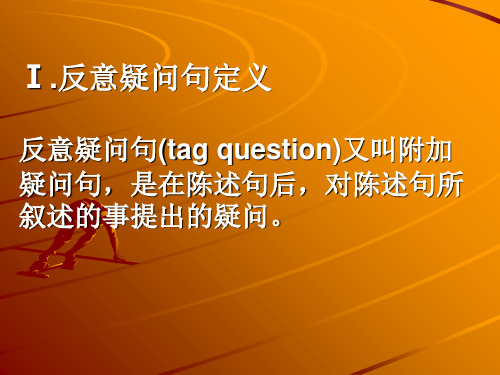
7.当陈述部分的主句是I think (expect, believe)等结构时,反 意疑问句的附加部分则往往与从 句中的主语和谓语动词保持对应 关系,但要注意否定的转移。 例如:
I think he’s funny, isn’t he? I don’t believe she likes my
You must have seen the film last week, didn’t you?
6. 当陈述部分是I am…时,反意疑 问句部分通常要用aren’t I;如陈述 句部分的主语是I am not时,反意疑 问句部分通常要用am I。 例如:
1)I am a teacher, aren’t I?
Ⅰ.反意疑问句定义
反意疑问句(tag question)又叫附加 疑问句,是在陈述句后,对陈述句所 叙述的事提出的疑问。
Ⅱ.基本结构:
陈述句+逗号+简短的一般疑问句?
遵循前肯定后否定前否后肯式的原则
①前肯后否式。例如:
You are all students, aren’t you﹖
②前否后肯式。例如:
Let’s have a rest, shall we? 以let us开头的祈使句,不包括 说话人在内,因此反意疑问句的 附加部分用will you。例如:
Let us stop now, will you?
Ⅳ. 反意疑问句的回答 “ 根据事实回答”
对反意疑问句的回答,无论问题的提法如何,如果 事实是肯定的,就用yes,事实是否定的,就要用no。 要特别注意陈述句部分是否定结构,反意疑问句部分 用肯定式提问时,回答yes或no与汉语正好相反。这 种省略回答的yes要译成“不”,no要译成“是”。
完整反义疑问句课件

04
反义疑问句的回答
肯定回答
要点一
肯定回答时,通常使用“Yes”来 回答反义疑问句,并重复…
You like apples, don’t you? 回答:Yes, I do.
要点二
如果对反义疑问句中的否定部分 进行强调,可以使用“Yes…
You didn’t go to the party, did you? 回答:Yes, I did.
详细描述
反义疑问句是一种常见的语法结构,通常用于表达说话者的 态度、观点或对某件事情的疑问。它的特点是前半部分是一 个肯定或否定的陈述句,而后半部分则通过疑问的形式表达 相反的意思。
类型
总结词
反义疑问句可以分为两种类型,即标准反义疑问句和非标准反义疑问句。
详细描述
标准反义疑问句的前半部分是一个肯定句,后半部分是一个否定疑问句;或者 前半部分是一个否定句,后半部分是一个肯定疑问句。而非标准反义疑问句则 不遵循这一规则,前后两部分没有明显的相反意思。
总结词
表示某些特殊情况或特殊用法,需要特 别注意。
VS
详细描述
在某些特殊情况下,反义疑问句的用法可 能会发生变化。例如,当陈述句为祈使句 时,反义疑问句通常会省略主语;当陈述 句为感叹句时,反义疑问句通常会省略疑 问词。此外,还有一些特殊的反义疑问句 结构,如“他不是学生吗?”等,需要特 别注意其用法和含义。
否定回答
要点一
否定回答时,可以使用“No”来 回答反义疑问句,并重复疑…
You don’t like coffee, do you? 回答:No, I don’t.
要点二
如果对反义疑问句中的肯定部分 进行强调,可以使用“No,…
You went to the concert, didn’t you? 回答:No, I didn’t.
反义疑问句(共14张PPT)全

二、前否+后肯
1.She wasn’t ill last week, was she ? 2.It doesn’t often rain here, does it? 3.Tom won’t go to Shanghai next year,
will he ?
特殊用法1—祈使句的反义疑问句
1、肯定祈使句的反意疑问句,疑问部分用will you或won’t you,否定祈使句则用will you ? 如: Don't do that again, will you? Go with me, will you / won't you?
13、He who seize the right moment, is the right man.谁把握机遇,谁就心想事成。2024/10/172024/10/172024/10/172024/10/1710/17/2024 +14、谁要是自己还没有发展培养和教育好,他就不能发展培养和教育别人。2024年10月17日星期四2024/10/172024/10/172024/10/17 +15、一年之计,莫如树谷;十年之计,莫如树木;终身之计,莫如树人。2024年10月2024/10/172024/10/172024/10/1710/17/2024 +16、教学的目的是培养学生自己学习,自己研究,用自己的头脑来想,用自己的眼睛看,用自己的手来做这种精神。2024/10/172024/10/17October 17, 2024 +17、儿童是中心,教育的措施便围绕他们而组织起来。2024/10/172024/10/172024/10/172024/10/17
一 、前肯+后否 含be动词
1.He is a doctor, isn’t he? 2.I am Chinese, aren’t I?
反义疑问句PPT课件
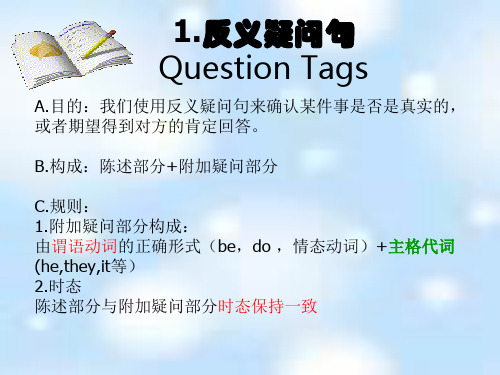
陈述部分
疑问部分
mustn't表示“禁止,不可, 不必”时
must
例句
You mustn't stop your car here,must you?
must表示“有必要”时
needn't
They must finish the work today,needn't they?
当must用来表示对现在的 情况进行推测时
She must have read the novel last week,didn't she?
Your daughter must have 要用“haven't/hasn't+主语”。 been to Africa, hasn't
she ?
You must be tired , _ar_e_n’_t _yo_u___ ?
2) 祈使句式反意疑问句
Let’s go home,_s_h_a_ll_w_e_? Let us go,__w__il_l _yo_u__? Let me go,_w__il_l _y_ou__? Come here please, __w_i_ll_y_o_u__? Never ask her again,_w__il_l /_c_a_n__y_ou__?
语
there, didn't he? / usedn't he?
had better(最好) + v.
hadn't you?
would rather(宁可、宁愿) +v.
wouldn't +主语
You'd like to +v.
反义疑问句详细讲解课件(PPT27张)

Kate has to help her mother at home,doesn’t she?
3) have表示“吃,喝,玩,度过”等意 思时,其附加问句的谓语应用助动词do.
They had a good time in Beijing ,didn’t they?
Ⅰ.反意疑问句定义
反意疑问句(tag question)又叫附加 疑问句,是在陈述句后,对陈述句所 叙述的事提出的疑问。
Ⅱ.基本结构:
陈述句+逗号+简短的一般疑问句?
遵循前肯定后否定前否后肯式的原则
①前肯后否式。例如:
You are all students, aren’t you﹖
②前否后肯式。例如:
[误] Tom can speak Chinese well, can’t Tom﹖
[正] Tom can speak Chinese well, can’t he﹖
一般现在时:
Lily likes going shopping, d_o_e_s_n__’t_she? They aren’t students, __a_r_e___
You must have seen the film last week, didn’t you?
6. 当陈述部分是I am…时,反意疑 问句部分通常要用aren’t I;如陈述 句部分的主语是I am not时,反意疑 问句部分通常要用am I。 例如:
1)I am a teacher, aren’t I?
The End
They must come on time,needn’t they?
2)must表示推测,“一定,想必”之意,附加问 句的谓语动词的确定应根据must后面的动词。
反义疑问句的用法归纳 课件 共27张PPT

Please help us, will you? 请帮帮我们,好吗?
Come with us, will you? 同我们一起去,好吗?
Don’t forget to post the letter, will you? 请别忘了寄信。
五、陈述部分为祈使句的反意疑问句
3. 当祈使句为Let us时,若表示请求,疑问部分用will you,若表示建 议,疑问部分用 shall we:
Let us know your address, will you? 好吗?
请把你的地址告诉我们,
Let us go swimming together, shall we? 吗?
我们一起去游泳好
反义疑问句的用法归纳 课件 共27张PPT
反义疑问句的用法归纳 课件 共27张PPT
六、陈述部分为主从复合句的反意疑问句
• 1. 当陈述部分为主从复合句【主句+从句】时,疑问部分一般应与主句保 持一致:
He said that he didn’t like it, didn’t he? 它,是不是?
你不准笑,知道吗?
② 若must表示推测,疑问部分不能用must,而应根据must后的动词结 构采用相应的动词形式:
He must be tired, isn’t he?
他一定累了,是吗?
反义疑问句的用法归纳 课件 共27张PPT
反义疑问句的用法归纳 课件 共27张PPT
五、陈述部分为祈使句的反意疑问句
We need not do it again, need we ? He dare not say so, dare you? 【注】当dare, need 为实义动词时,疑问部分用助动词do + 主语。 She doesn't dare to go home alone, does she?
反义疑问句(共14张PPT)
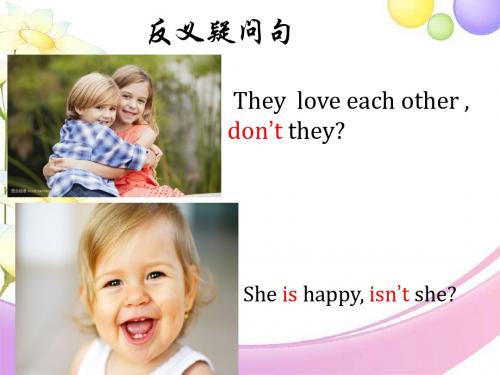
—He isn’t dancing, is he? __ No, he isn’t.
课堂练习
1.They are going to visit me,_a_r_e__n_’_t_t_hey_? 2.It often rains here,d__o_e__s_n_’_t_i_t__? 3.He isn’t a doctor, __is__h__e_____? 4.You don’t have a headache,d__o__y__ou ? 5.He can hardly speak English or
2、Let‘s 开头的祈使句,后用shall we? 而Let us 开 头的祈使句,后用will you ?
特殊用法2-----There be 句型
陈述部分是“there be”结构时,疑问部分用be there。
There is something wrong with your watch, isn't there?
2.You have finished your homework, haven’t you? 3.He can speak both English and Chinese, can’t he?
行为动词
1.They come from America, don’t they? 2.Tom went to Shanghai last year,didn’t he?
10.There wasn’t anything new on TV last night,w__a_s__t_h_e__r_e_?
11.—He’s already gone to Australia, __D_______?—_________. He is on a visit to Shanghai. A. isn’t he; No B. hasn’t he;Yes C. isn’t he; Yes D. hasn’t he; No
反义疑问句讲解PPT课件

•
642 Guang Zhong Road
•
Shanghai, 200080
•
P. R. CHINA
Main ideas
• Joe Lampson’s decision surprised his father(1-2)
• Joe Lampson’s program improved the trading situation in business.(3)
didn’t he? • 但陈述部分为I
think/believe/suppose/figure/imagine/feel等+宾 语从句时,疑问部分应同宾语从句保持一致 • I don’t think he can finish his work in time, can he?我觉得他不能及时完成工作,他能吗?
1 There is a pen on the chair, Isn’t there ? 2 There are 60 students in our class, Aren’t 3. There will be a paper factory near mthyere? home in about 2 years, Won’t there ?
7. 祈使句的反意疑问句
祈使句, will you ?
1 Don’t be late, w_i_ll__y_ou______? 2 Have a rest, ___w_i_ll _y_o_u___? 3 Speak louder, __w__il_l _yo_u____? 4 Don’t wait for me, _w_il_l _y_ou____? 祈使句无论是肯定的还是否定的,疑问部分 一般用will you?
初中英语《反义疑问句》23页PPT

初中英语《反义疑问句》
•
26、我们像鹰一样,生来就是自由的 ,但是 为了生 存,我 们不得 不为自 己编织 一个笼 子,然 后把自 己关在 里面。 ——博 莱索
•
27、法律如果不讲道理,即使延续时 间再长 ,也还 是没有 制约力 的。— —爱·科 克
•
28、好法律是由坏风俗创造出来的。 ——马 克罗维 乌斯
•
29、在一切能够接受法律支配的人类 的状态 中,哪 里没有 法律, 那里就 没有自 由。— —洛克
•
Hale Waihona Puke 30、风俗可以造就法律,也可以废除 法律。 ——塞·约翰逊
谢谢你的阅读
❖ 知识就是财富 ❖ 丰富你的人生
71、既然我已经踏上这条道路,那么,任何东西都不应妨碍我沿着这条路走下去。——康德 72、家庭成为快乐的种子在外也不致成为障碍物但在旅行之际却是夜间的伴侣。——西塞罗 73、坚持意志伟大的事业需要始终不渝的精神。——伏尔泰 74、路漫漫其修道远,吾将上下而求索。——屈原 75、内外相应,言行相称。——韩非
